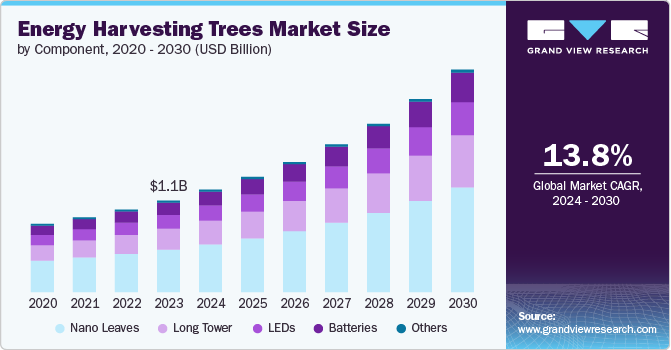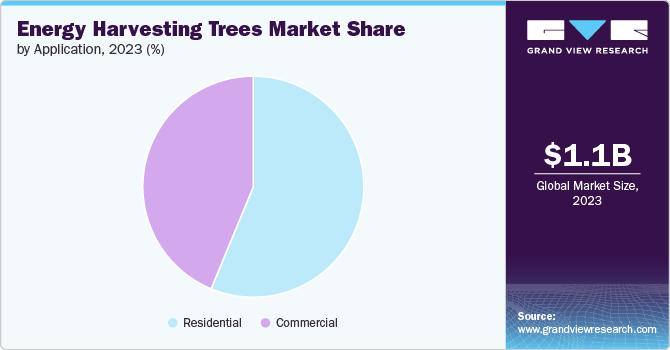- Home
- »
- Power Generation & Storage
- »
-
Energy Harvesting Trees Market Size & Share Report, 2030GVR Report cover
![Energy Harvesting Trees Market Size, Share & Trends Report]()
Energy Harvesting Trees Market (2024 - 2030) Size, Share & Trends Analysis Report By Component (Nano Leaves, Long Tower, LEDs, Batteries), By Technology, By Application, By Region, And Segment Forecasts
- Report ID: GVR-4-68040-365-2
- Number of Report Pages: 150
- Format: PDF
- Historical Range: 2018 - 2022
- Forecast Period: 2024 - 2030
- Industry: Energy & Power
- Report Summary
- Table of Contents
- Segmentation
- Methodology
- Download FREE Sample
-
Download Sample Report
Energy Harvesting Trees Market Trends
The global energy harvesting trees market size was estimated at USD 1.06 billion in 2023 and is expected to grow at a CAGR of 13.8% from 2024 to 2030. The global market is witnessing significant growth driven by increasing demand for sustainable energy solutions and advancements in renewable energy technologies. This innovative technology has garnered attention due to its aesthetic appeal and practical benefits in urban environments.

Recent years have seen several new product launches in this space, reflecting the market's dynamism and potential. For instance, companies have introduced energy harvesting trees with improved efficiency in energy conversion and integration of advanced materials such as nano leaves. These advancements not only enhance the performance of energy harvesting trees but also cater to the growing demand for green energy solutions in both residential and commercial sectors.
Component Insights
Nano leaves are emerging as the preferred material for energy harvesting trees due to their high efficiency in converting solar energy into electricity. They offer a sleek design and robust performance, making them ideal for urban landscapes seeking both functionality and aesthetics.
Long towers provide structural support and height for energy harvesting trees, enabling better exposure to sunlight and wind. They contribute to the stability and functionality of these installations in various environmental conditions.
LEDs integrated into energy harvesting trees serve dual purposes of illumination and aesthetic enhancement. They are increasingly used in smart energy harvesting trees that adjust their energy absorption and lighting based on ambient conditions, thereby optimizing energy usage.
Batteries play a crucial role in storing harvested energy for later use, ensuring continuous operation and energy supply during low light or nighttime conditions. Advancements in battery technology have led to more efficient and long-lasting energy storage solutions for energy harvesting trees.
Technology Insights
The Piezovoltaic (PZ) segment accounted for the highest market share of over 63% in 2023. Thise technology converts mechanical vibrations into electrical energy, making it suitable for urban environments with high pedestrian traffic or vehicular movement. Its growth is driven by advancements in piezoelectric materials and integration techniques.
Photovoltaic (PV) technology remains a cornerstone of energy harvesting trees, utilizing solar cells to convert sunlight into electrical energy. Continuous improvements in PV efficiency and durability contribute to the widespread adoption of solar-powered energy harvesting trees worldwide.
Thermovoltaics (TV) technology utilizes temperature differences to generate electricity, complementing PV systems in environments where solar exposure may be limited but temperature differentials are significant. It enhances the overall energy yield of energy harvesting trees in diverse climates.
Application Insights
Based on application, the energy harvesting trees market is segmented into residential & commercial. Energy harvesting trees are increasingly popular in residential settings, where they provide sustainable energy solutions without compromising on space or aesthetic appeal. They contribute to green building certifications and enhance property value.
Commercial applications of energy harvesting trees are expanding rapidly, driven by corporate sustainability initiatives and the need for renewable energy sources in urban areas. They serve as iconic landmarks while fulfilling energy requirements for businesses.

Commercial applications of energy harvesting trees are expanding rapidly, driven by corporate sustainability initiatives and the need for renewable energy sources in urban areas. They serve as iconic landmarks while fulfilling energy requirements for businesses.
Regional Insights
The North American market for energy harvesting trees is characterized by a strong emphasis on sustainable development and innovative energy solutions. The U.S., in particular, plays a pivotal role due to its advanced technological landscape and supportive regulatory environment. Many cities and states have launched initiatives to integrate renewable energy sources into their infrastructure, promoting the use of energy harvesting trees in public spaces and residential areas.
Asia Pacific Energy Harvesting Trees Market Trends
Asia Pacific dominated the market and accounted for the largest revenue share of over 53% in 2023. The Asia Pacific region is experiencing rapid growth due to several factors. Urbanization and the increasing need for sustainable energy solutions are primary drivers. The region is witnessing significant investments in green infrastructure projects, with governments and private entities focusing on integrating renewable energy technologies into urban planning. Many cities in the region are implementing green urban projects that incorporate energy harvesting trees for both aesthetic and functional benefits.
China Energy Harvesting Trees Market Trends
China leads the Asia Pacific energy harvesting trees market, driven by its large-scale urbanization and commitment to renewable energy. The country’s focus on smart city initiatives and sustainable development has fostered the growth of this market. China's ambitious smart city projects are incorporating energy harvesting trees to enhance energy efficiency and reduce urban carbon footprints.
Europe Energy Harvesting Trees Market Trends
Europe is a mature market for energy harvesting trees, driven by stringent environmental regulations and a strong commitment to renewable energy. Germany is the leading country in this market, known for its innovative approaches to integrating green technologies into urban infrastructure. Strict environmental regulations across Europe are fostering the adoption of energy harvesting trees as part of broader efforts to reduce carbon emissions and promote renewable energy. The region has numerous renewable energy projects that incorporate energy harvesting trees, particularly in Germany, where there is a strong focus on green technology.
Key Energy Harvesting Trees Company Insights
The market is in nascent stage and characterized by intense competition and rapid technological advancements. Companies are continuously investing in research and development to improve their offerings. Strategic partnerships and collaborations are common as firms seek to enhance their capabilities and expand their market presence.
-
In January 2024, the researchers at University of Agriculture and Life Sciences in Hungary designed a prototype of a solar photovoltaic tree. The distance between solar modules is kept high compared to conventional solar designs, which helps improve cooling and dissipation of heat while reducing the shading losses between the panels.
-
In May 2023, SolarBotanic Trees, a UK based startup designed metal trees with a seven-meter canopy of solar panels which will be used to charge shopping malls and car parks in the country. The company has completed half-scale prototype of the product and is planning to develop a full-size version before commencement of commercial production.
-
In April 2023, the Public Works Department of India announced its intent to install solar energy harvesting trees in Sheikh Sarai area of South Delhi. Initially, it plans to build four trees, wherein these solar trees will be four to five meters tall and each branch of energy harvesting trees will be made up of 100-watt solar photovoltaic modules.
Key Energy Harvesting Companies:
The following are the leading companies in the energy harvesting trees market. These companies collectively hold the largest market share and dictate industry trends.
- Solar Botanic
- Sologic Ltd.
- Treepower Australia
- Treelectric
- Solar Tree SL
- Dyaqua
- Arborea
- Solartech Universal, LLC
- Volt Tree
- Creative Smart Innovations
- Lucid Management Group
- Green World Investor
- Envision Solar
- Spotlight Solar
Energy Harvesting Trees Market Report Scope
Report Attribute
Details
Market size value in 2024
USD 1.18 billion
Revenue forecast in 2030
USD 2.57 billion
Growth rate
CAGR of 13.8% from 2024 to 2030
Historical data
2018 - 2022
Forecast period
2024 - 2030
Quantitative units
Revenue in USD million/billion and CAGR from 2024 to 2030
Report coverage
Revenue forecast, competitive landscape, growth factors and trends
Segments covered
Component, technology, application, region
Regional scope
North America; Europe; Asia Pacific; Rest of World
Country Scope
U.S.; Canada; Mexico; Germany; UK; France; Italy; Spain; China; India; Japan; South Korea; Australia
Key companies profiled
Solar Botanic; Sologic Ltd.; Treepower Australia; Treelectric; Solar Tree SL; Dyaqua; Arborea; Solartech Universal, LLC; Volt Tree; Creative Smart Innovations; Lucid Management Group; Green World Investor; Envision Solar; Spotlight Solar
Customization scope
Free report customization (equivalent up to 8 analyst’s working days) with purchase. Addition or alteration to country, regional & segment scope
Pricing and purchase options
Avail customized purchase options to meet your exact research needs. Explore purchase options
Global Energy Harvesting Trees Market Report Segmentation
This report forecasts revenue growth at global, regional, and country levels and provides an analysis of the latest industry trends in each of the sub-segments from 2018 to 2030. For the purpose of this study, Grand View Research has segmented the global energy harvesting trees market report based on component, technology, application, and region:
-
Component Outlook (Revenue, USD Million, 2018 - 2030)
-
Nano Leaves
-
Long Tower
-
LEDs
-
Batteries
-
Others
-
-
Technology Outlook (Revenue, USD Million, 2018 - 2030)
-
Photovoltaic (PV)
-
Thermovoltaics (TV)
-
Piezovoltaic (PZ)
-
-
Application Outlook (Revenue, USD Million, 2018 - 2030)
-
Commercial
-
Residential
-
-
Regional Outlook (Revenue, USD Million, 2018 - 2030)
-
North America
-
U.S.
-
Canada
-
Mexico
-
-
Europe
-
Germany
-
UK
-
France
-
Italy
-
Spain
-
-
Asia Pacific
-
China
-
India
-
Japan
-
South Korea
-
Australia
-
-
Rest of World
-
Frequently Asked Questions About This Report
b. The global Energy Harvesting Trees market size was estimated at USD 1.06 billion in 2023 and is expected to reach USD 1.18 billion in 2024.
b. The Energy Harvesting Trees market is expected to grow at a compound annual growth rate of 13.8% from 2024 to 2030, reaching USD 2.57 billion by 2030.
b. In 2023, the piezovoltaic segment held the largest market share at over 63%. This technology transforms mechanical vibrations into electrical energy, making it ideal for urban settings with heavy pedestrian or vehicular traffic. Its growth is propelled by advancements in piezoelectric materials and integration techniques.s in piezoelectric materials and integration techniques drive its growth.
b. Key players in the market include Solar Botanic; Sologic Ltd.; Treepower Australia; Treelectric; Solar Tree SL; Dyaqua; Arborea; Solartech Universal, LLC; Volt Tree; Creative Smart Innovations; Lucid Management Group; Green World Investor; Envision Solar; and Spotlight Solar.
b. The global market for energy-harvesting trees is experiencing substantial growth, propelled by the rising need for sustainable energy solutions and the development of renewable energy technologies. This groundbreaking technology has gained attention for its visual appeal and practical advantages in urban settings.
Share this report with your colleague or friend.
Need a Tailored Report?
Customize this report to your needs — add regions, segments, or data points, with 20% free customization.

ISO 9001:2015 & 27001:2022 Certified
We are GDPR and CCPA compliant! Your transaction & personal information is safe and secure. For more details, please read our privacy policy.
Trusted market insights - try a free sample
See how our reports are structured and why industry leaders rely on Grand View Research. Get a free sample or ask us to tailor this report to your needs.










